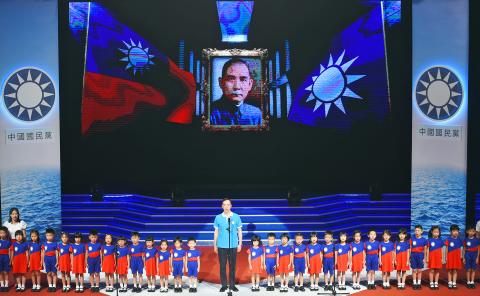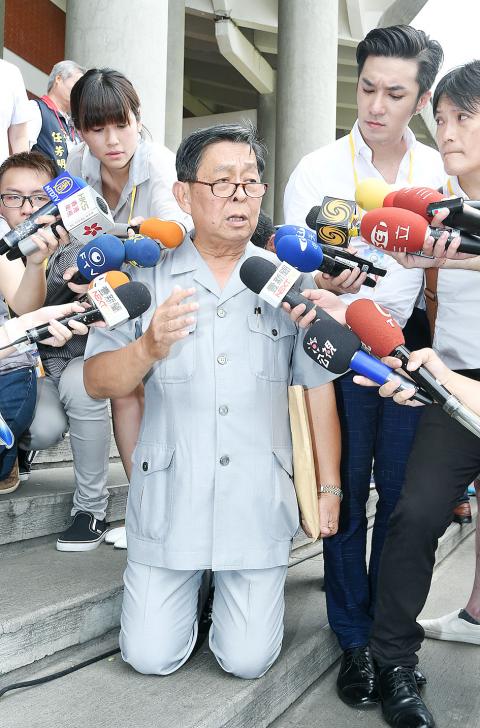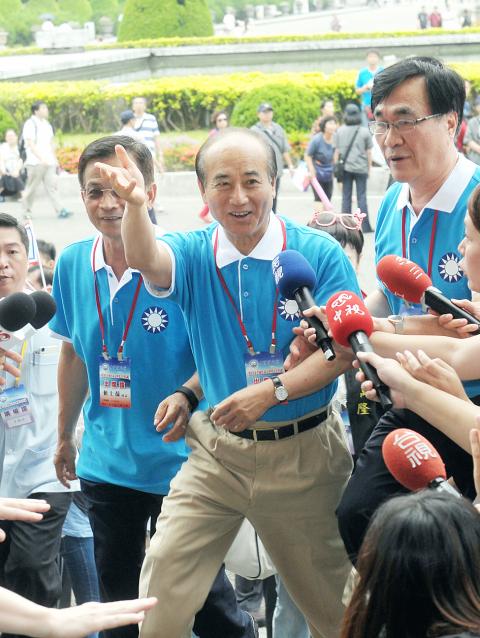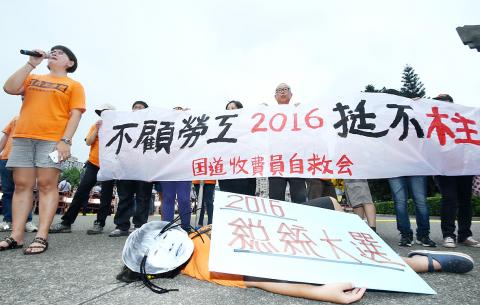Chinese Nationalist Party (KMT) heavyweights, including Legislative Speaker Wang Jin-pyng (王金平), yesterday attended the party’s National Congress in a show of solidarity, as the party representatives vowed to win the January presidential and legislative elections.
Wang, a leader of a pro-localization faction whose members wanted him to be the party’s presidential candidate instead of Deputy Legislative Speaker Hung Hsiu-chu (洪秀柱), was among the about 1,200 representatives in the National Sun Yat-sen Memorial Hall in Taipei when Hung’s nomination was passed.
However, he downplayed reports from unnamed sources that KMT Chairman Eric Chu (朱立倫) had agreed to revise the party’s nomination rules so that Wang could stand for another term as a legislator-at-large, and therefore another term as speaker, in exchange for his supporting Hung.

Photo: Chang Chia-ming, Taipei Times
“I am not aware of that,” Wang told reporters before adding: “Do not ask me this question again.”
Despite reports that some of Wang’s supporters were going to make a bid at the event to revise the nomination rules, no such proposal was made during the half-day congress.
Ahead of the congress, Chu yesterday said that any revisions to the rules would not require approval of the congress and that issues related to nominations of legislators-at-large would not be discussed until a meeting of the KMT Central Standing Committee in September.

Photo: Fang Pin-chao, Taipei Times
Wang last week declined Hung’s request that he become director of her presidential campaign, saying that he would be too busy with legislative affairs.
At the opening and closing ceremonies, Chu repeatedly called for solidarity, saying that the KMT is the only party that can stand up for local interests, maintain stable cross-strait relations and gain the trust of international community.
“[Taiwan] cannot afford the consequence if the KMT collapses,” Chu said. “The KMT is a responsible party. It has to assume responsibility to advance the public’s benefits and the development of the Republic of China.”

Photo: CNA
In his speech to the congress, President Ma Ying-jeou (馬英九), who returned home on Saturday night from a trip to three diplomatic allies, touted his administration’s achievements in diplomacy, cross-strait relations, economic development and social welfare.
“I have never done anything over the past eight years for which I should feel I have done Taiwan wrong,” Ma added after saying that the unemployment rate dropped to 3.63 earlier this year, the nation’s GDP growth last year was 3.74 percent and Taiwan continued to score well in international competitiveness ratings.
In discussion sessions, many party representatives spoke of the need for unity so the party could win the January elections and voiced support for the Chu-backed decision to revoke the memberships of five vocal critics of the party.

Photo: Fang Pin-chao, Taipei Times
One of the five, Lee Po-jung (李柏融) — who had questioned the authenticity of the signatures Hung collected to back her candidacy — tried to enter the congress venue, but was prevented.
Kneeling down before reporters, Lee complained about Chu and said that his life was under threat, leading to an altercation between him and some KMT representatives.
In other developments, Tseng Wen-pei (曾文培) proposed that the KMT should not be hesitant to sue media outlets every time they publish a defamatory report against the party, and the suggestion was approved by the congress under the orders of KMT Vice Chairman Hau Lung-bin (郝龍斌), Taipei’s former mayor, who then chaired the discussions session.
Outside the hall, Freeway Toll Collector Self-Help Organization members held a rally to protest against the KMT and Premier Mao Chi-kuo (毛治國) — who was attending the congress — for neglecting workers’ contributions to the nation.
A dozen protestors clad in orange were hemmed in by barricades and closely watched by a group of police officers who had been deployed to prevent potential clashes between protestors and KMT supporters.
“If the KMT wants to win in 2016, please listen to the laborers’ voice,”the protesters shouted.
In a play on words, they said “if workers’ needs are not attended to, [the KMT] would not be able to ‘uphold’ the 2016 election,” using ting bu chu (挺不柱) with the homonym “柱,” which is Hung Hsiu-chu’s “chu,” instead of “住.”
Additional reporting by Alison Hsiao

An essay competition jointly organized by a local writing society and a publisher affiliated with the Chinese Communist Party (CCP) might have contravened the Act Governing Relations Between the People of the Taiwan Area and the Mainland Area (臺灣地區與大陸地區人民關係條例), the Mainland Affairs Council (MAC) said on Thursday. “In this case, the partner organization is clearly an agency under the CCP’s Fujian Provincial Committee,” MAC Deputy Minister and spokesperson Liang Wen-chieh (梁文傑) said at a news briefing in Taipei. “It also involves bringing Taiwanese students to China with all-expenses-paid arrangements to attend award ceremonies and camps,” Liang said. Those two “characteristics” are typically sufficient

A magnitude 5.9 earthquake that struck about 33km off the coast of Hualien City was the "main shock" in a series of quakes in the area, with aftershocks expected over the next three days, the Central Weather Administration (CWA) said yesterday. Prior to the magnitude 5.9 quake shaking most of Taiwan at 6:53pm yesterday, six other earthquakes stronger than a magnitude of 4, starting with a magnitude 5.5 quake at 6:09pm, occurred in the area. CWA Seismological Center Director Wu Chien-fu (吳健富) confirmed that the quakes were all part of the same series and that the magnitude 5.5 temblor was

The brilliant blue waters, thick foliage and bucolic atmosphere on this seemingly idyllic archipelago deep in the Pacific Ocean belie the key role it now plays in a titanic geopolitical struggle. Palau is again on the front line as China, and the US and its allies prepare their forces in an intensifying contest for control over the Asia-Pacific region. The democratic nation of just 17,000 people hosts US-controlled airstrips and soon-to-be-completed radar installations that the US military describes as “critical” to monitoring vast swathes of water and airspace. It is also a key piece of the second island chain, a string of

The Central Weather Administration has issued a heat alert for southeastern Taiwan, warning of temperatures as high as 36°C today, while alerting some coastal areas of strong winds later in the day. Kaohsiung’s Neimen District (內門) and Pingtung County’s Neipu Township (內埔) are under an orange heat alert, which warns of temperatures as high as 36°C for three consecutive days, the CWA said, citing southwest winds. The heat would also extend to Tainan’s Nansi (楠西) and Yujing (玉井) districts, as well as Pingtung’s Gaoshu (高樹), Yanpu (鹽埔) and Majia (瑪家) townships, it said, forecasting highs of up to 36°C in those areas